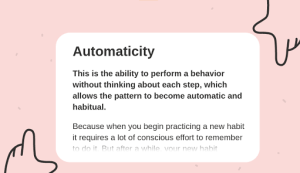As the cursor blinks before you and moments of inaction fade away, words begin to form as you write, then vanish. Sighs. Another set of words forms, to replace the previous, and it vanishes again!
Frustration sets in.
Nearly every writer has experienced this ordeal, including Shakespeare.
Writing shouldn’t get complicated. Initially, it may seem so, but through constant engagement comes ease. This stage is known as automaticity.
What is Automaticity?
Automaticity involves doing a thing till it becomes automatic. Minimal cognitive effort is required for this activity, i.e., almost without thinking about the steps or process of completing the task.
For example, learning how to ride a bicycle is not an easy process. You fall off, crash, break a leg, ride and fall off again. This continues till you reach a point when you can ride with ease and then without your hands and even execute some skills.
The same applies when you’re learning how to drive a car. The initial stage is rigorous. You must reverse cautiously and ride with your back arched towards the wheel. But now you’ve gotten to a point where you can even read this post while driving (that’s a nasty habit, but you get the point).
A child learns how to walk by making those baby steps with a rising, misstep, fall, rising, and on it goes on till after years of consistency, walking becomes the easiest thing to do.
This is the same for writing.
Before we look at developing automaticity in writing and its benefits, we’d see some problems hindering us from getting to this point.
Problems Associated with Writing
Cognitive and Affective
Mood affects our inspiration.
Sometimes we have difficulty putting down what’s in our head because we don’t know what to write or find a way to express ourselves.
Remaining stuck in this problem will hinder your writing from becoming automatic. Therefore, you must know that cognitive and affective issues can happen to everyone and have ways to get past them.
Quest for perfection
We want perfection. And most times, when we write, words vanish so quickly because the writings are imperfect. As of 2010, there were 129,864 880 books available worldwide, according to Google; imagine those authors decided not to publish because they followed the hunch that their writings were imperfect.
Issues like this slow down writers and prevent them from reaching the automaticity stage. What’s the solution?
Developing Automaticity in Writing
Your writing can be so effortless with high accuracy in such a short time. Although, it comes with consistent practice and intentionality to improve. Like the driving process where we fall and rise, we’d make mistakes, get embarrassed, and have many ups and downs. It’s all part of the plateau of latent potential.
The following is what you should look out for if you want to improve your writing:
Find topics before writing
Thinking of what to write is tasky and frustrating.
Before you begin to write, have a laid down topic. You can get these topics through keyword research, and they will contain problems and solutions you’re offering to your audience.
This enables your mind to focus and helps ideas flow easily.
Lower Emphasis on Accuracy During First Draft
Accuracy is perfection.
Unfortunately, in writing, we can’t attain perfect work on the first attempt; that’s why we have editors and chief editors; they’re to see the imperfections your eyes didn’t see.
You will always have enough time to deal with inaccuracy, so lower your emphasis on spelling and grammar accuracy when writing your first draft.
The greatest writers’ first drafts were nonsense, but their works improved as they proofread. Therefore, lower your emphasis on accuracy when you’re writing the first draft and create time to proofread your inaccuracies; else, this will slow you down and snuff out your inspiration.
Find a Niche
Writing in a niche will help you master the craft quickly.
When you read on a particular niche, you gather knowledge, your mind expands, the writing flow becomes more accessible, and creativity can set in. For example, it’ll be easier for a mechanical engineer to give an hour’s impromptu speech on physics because he has a bank of knowledge on this subject than a poet.
Writing becomes a struggle because of insufficient knowledge of a subject. Focusing on a niche makes writing fun and effortless.
Write Everyday
Writing every day improves your writing skills like walking every day did.
As you practice writing, you improve because practice makes perfect.
Your writing must be purposeful. Through it, you’re developing your style, refining your ideas till you’re loosened up and have found your voice. As you write, you work on your spelling, grammar, sentence structure, research, and many other areas hindering you from becoming a better writer.
Bottom Line
Automaticity is not a stage we’d get to so quickly. It requires a lot of time, investment, and conscious practice.
There’s no specific time allocated to it like the 10,000 hours rule. You keep struggling till you get to the point where you cross the line. It’s a definite moment. Writing becomes easier and faster.
Skills development, at this stage, could stagnate because of the feeling that there’s nothing to learn but discipline and sticking to the basics will spare you.
You can focus on other areas like style development, marketing, etc.



Oh, boy. I should start writing every day again. I would love to say writing will be automatic to me one day. Thanks for these tips. These are really helpful.